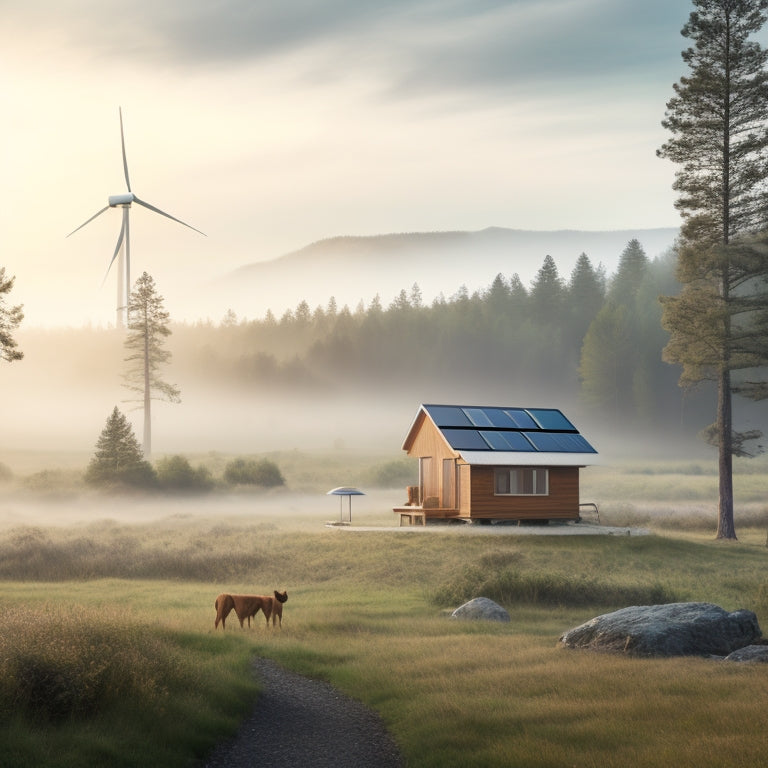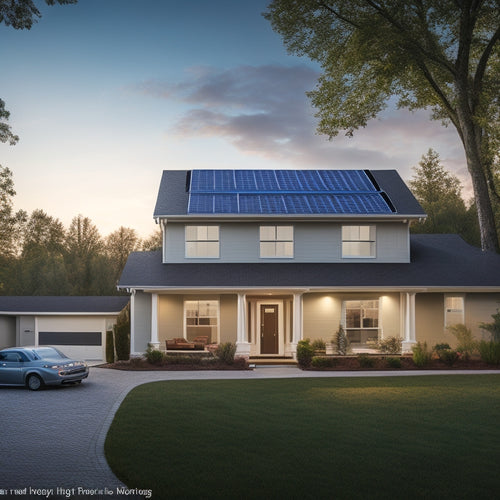
Off-Grid Energy Essentials: Top Inverter Picks
Share
When selecting an inverter for your off-grid energy system, you'll need to assess the type that suits your needs, whether it's a string inverter for large-scale systems or a microinverter for smaller applications. Key features to look for include high power conversion efficiency above 95%, durability, and strong system monitoring capabilities. Additionally, surge capacity, power factor, and harmonic distortion are essential metrics to evaluate. Proper inverter sizing and capacity calculation are vital, as under-sizing can lead to reduced performance and system failure. By understanding these essentials, you'll be well on your way to finding the perfect inverter for your off-grid needs, and next, you can investigate more specific comparisons and brand options to make an informed decision.
Overview
- When selecting an inverter, consider the type (string, micro, or power optimizer) based on system size and compatibility with battery chemistry and voltage.
- Look for high power conversion efficiency (above 95%) and durability (10-20 years) to minimize energy losses and ensure long-term performance.
- Key features to consider include surge capacity, system monitoring, and safety features like emergency shutdown, overload protection, and thermal management.
- Proper inverter sizing is crucial to handle power requirements, and calculation of power requirements should include surge capacity for accurate sizing.
- Research and compare top inverter brands like Schneider Electric, OutBack Power, and Magnum Energy, considering factors like reputation, customer reviews, features, pricing, and warranties.
Choosing the Right Inverter Type
When building an off-grid energy system, your inverter is the lynchpin that converts DC power from your solar panels or wind turbine into usable AC electricity for your home or business.
You'll need to choose the right inverter type to guarantee a reliable and efficient power supply. There are three primary inverter types: string inverters, microinverters, and power optimizers.
String inverters are suitable for large-scale systems, while microinverters are ideal for smaller, residential applications. Power optimizers offer a compromise between the two.
Consider your system's size, configuration, and budget when selecting an inverter type. It's also vital to confirm inverter compatibility with your battery chemistry, voltage, and charging requirements to prevent damage and system failure.
Additionally, peak power tracking and advanced features like MPPT can enhance energy harvesting and overall system efficiency.
For instance, if you have a small, rooftop solar array, microinverters might be the best fit.
Top Features to Consider
You're now evaluating the top features that'll make or break your off-grid energy system. To guarantee maximum performance and reliability, you'll want to focus on power conversion efficiency, inverter durability factors, and system monitoring capabilities.
When selecting an inverter, it's important to take into account the type of inverter, such as modified sine wave or pure sine wave, as it affects the compatibility with your renewable energy sources. Additionally, assessing the inverter's surge capacity and overload protection is essential for handling sudden power spikes.
Power Conversion Efficiency
As you select a power conversion system for your off-grid energy setup, considering the power conversion efficiency is essential to guarantee peak performance and minimize energy losses. Efficiency is critical since it directly affects the amount of energy your system can produce. Look for inverters with high efficiency ratings, typically above 95%.
| Feature | Ideal Range |
|---|---|
| Efficiency (%) | 95-98 |
| Power Factor | 0.9-1.0 |
| Harmonic Distortion (%) | <3 |
| Surge Capacity (x) | 1.5-3 |
| Overload Capacity (%) | 120-150 |
A high power factor guarantees your inverter can handle reactive loads, while low harmonic distortion prevents grid instability. Be certain to evaluate these critical factors when choosing your power conversion system. By doing so, you'll guarantee your off-grid energy setup operates at its best.
Inverter Durability Factors
Selecting an inverter with high power conversion efficiency is only half the battle; it's equally important to guarantee your inverter can withstand the demands of off-grid energy production over an extended period.
When evaluating inverter durability, consider the inverter lifespan, which can range from 10 to 20 years or more, depending on the quality of the unit and environmental factors. Advanced inverter technology features, such as real-time monitoring and control, also play a vital role in confirming peak energy harvesting and minimizing downtime.
Environmental resilience is also essential, as your inverter will be exposed to varying temperatures, humidity, and other environmental stressors. Look for inverters with ruggedized designs, sealed enclosures, and protective coatings to secure reliable operation in harsh conditions.
System Monitoring Capabilities
When it comes to off-grid energy production, staying on top of your system's performance is essential to maximizing energy harvesting and minimizing downtime.
You'll want to prioritize inverters with strong system monitoring capabilities to guarantee peak performance. Look for inverters with built-in monitoring software that provides real-time data analytics on your system's energy production, consumption, and storage.
This data will enable you to identify areas for improvement, refine your system's configuration, and troubleshoot issues remotely. Advanced monitoring features may include customizable alerts, energy forecasting, and data logging.
Inverter Efficiency Explained
When selecting an inverter for your off-grid energy system, you'll want to contemplate its peak efficiency ratings, which indicate the maximum amount of power it can convert without losing energy as heat.
However, you also need to factor in energy loss factors, such as voltage drop and temperature effects, that can reduce the inverter's overall efficiency.
Peak Efficiency Ratings
Most modern inverters boast a peak efficiency rating of around 95%, which may seem impressive at first glance.
However, it's essential to understand that this rating is based on ideal operating conditions, not real-world scenarios.
Peak efficiency ratings represent the highest possible efficiency an inverter can achieve, typically at a specific peak load.
Efficiency benchmarks are set by manufacturers under controlled lab conditions, which don't always translate to your off-grid setup.
When evaluating inverters, consider the efficiency ratings under various load conditions, not just the peak rating.
This will give you a more accurate representation of the inverter's performance in your unique off-grid energy system.
Energy Loss Factors
In the pursuit of optimizing your off-grid energy system, understanding the factors that impact inverter efficiency is essential.
You need to identify areas where energy loss occurs to maximize your system's performance. One major factor is inverter inefficiency, which can be attributed to heat generation, electrical resistance, and switching losses.
These losses can be significant, resulting in reduced power output and increased heat generation. To mitigate this, look for inverters with high efficiency ratings and advanced cooling systems.
Additionally, guarantee proper installation, maintenance, and monitoring to minimize energy loss.
Ideal Operating Ranges
Nearly 95% of off-grid energy systems rely on inverters to convert DC power from solar panels or batteries into usable AC power.
When choosing an inverter, you need to take into account its ideal operating ranges for maximum efficiency. Look for inverters with ideal voltage ranges between 24-48V DC, as this allows for optimal energy conversion.
Temperature effects also play a significant role, as extreme heat or cold can reduce efficiency. Opt for inverters with built-in temperature compensation or thermal management systems to guarantee consistent performance.
Size Matters: Inverter Capacity
Your off-grid energy system's inverter is the essential link between your renewable energy source and the electrical loads it powers.
When it comes to inverter sizing, getting it right is vital. You need to verify your inverter can handle the power requirements of your system. Under-sizing your inverter can lead to reduced performance, overheating, and even system failure.
On the other hand, over-sizing can result in wasted money and resources. To determine the right inverter capacity, calculate the total power requirements of your electrical loads, including surge capacity.
Consider factors like appliances, lighting, and charging needs. Then, select an inverter that can handle the maximum power demand.
Proper inverter sizing guarantees efficient, reliable, and safe operation of your off-grid energy system.
Grid Tied Vs off Grid Inverters
You've determined the right inverter capacity for your off-grid energy system, but now it's time to evaluate the type of inverter that's best suited for your needs.
Grid-tied inverters synchronize with the grid's frequency and voltage, allowing you to sell excess energy back to the utility company. They're ideal for homes already connected to the grid, but they won't provide backup power during outages.
Off-grid inverters, on the other hand, operate independently of the grid, making them perfect for remote locations or those seeking energy independence.
When choosing between the two, consider your inverter applications and installation considerations. Will you need to connect to the grid or operate solely off-grid? Do you require backup power during outages?
Answering these questions will help you select the right inverter for your off-grid energy system.
Safety Features to Look For
What specific safety features should you prioritize when selecting an off-grid inverter?
You'll want to guarantee it has an emergency shutdown mechanism to prevent damage in case of a fault.
Overload protection and surge suppression are also essential to prevent electrical shock and equipment damage.
Thermal management is imperative to prevent overheating, which can lead to fires.
A user-friendly interface is necessary for easy monitoring and maintenance.
Additionally, consider inverters with low maintenance requirements and installation safety features that minimize the risk of electrical shock.
Look for inverters with electrical isolation to prevent current leakage and guarantee compliance with relevant standards.
Top Inverter Brands Compared
Selecting the right off-grid inverter brand can be a challenging task, especially with the numerous options available in the market. You need to evaluate factors like brand reputation, customer reviews, and technical specifications to make an informed decision.
Renowned brands like Schneider Electric, OutBack Power, and Magnum Energy offer high-quality inverters with advanced features and reliable performance. However, you may also want to investigate newer brands like Victron Energy and Sungrow, which offer competitive pricing and innovative solutions.
Compare the features, pricing, and warranty offered by each brand to determine which one best fits your off-grid energy needs. By doing your research, you can find the perfect inverter to power your freedom.
Frequently Asked Questions
Can I Use a Grid-Tied Inverter for Off-Grid Systems?
You can't use a grid-tied inverter for off-grid systems, as they're designed to sync with the grid, not operate independently; their advantages, like efficiency and cost-effectiveness, are offset by limitations, such as requiring a grid connection to function.
How Do I Ground an Off-Grid Inverter System Safely?
As you commence on the expedition to energy independence, don't overlook the vital step of grounding your off-grid inverter system safely. You'll need to employ proper grounding techniques, adhering to stringent safety standards, to guarantee your system's reliability and your freedom from electrical hazards.
Do Off-Grid Inverters Work With Generators or Only Solar?
You'll be relieved to know that off-grid inverters can work seamlessly with generators, not just solar, ensuring a reliable energy supply. Look for models with high generator compatibility and inverter efficiency to maximize your power output and minimize energy losses.
Can I Add More Batteries to My System Later On?
As you chart your path to energy independence, you'll find that expanding your battery bank is a key milestone. You can add more batteries later, but guarantee system compatibility by choosing an inverter that supports battery expansion, allowing you to scale up your power storage as your needs evolve.
Are Off-Grid Inverters Compatible With Lithium-Ion Batteries?
You'll be happy to know that most off-grid inverters are compatible with lithium-ion batteries, thanks to built-in battery management systems that guarantee safe and efficient charging and discharging, giving you the freedom to power your off-grid lifestyle.
Ready to Buy
As you commence your off-grid energy adventure, remember that the right inverter is the backbone of your system. It's the unsung hero that silently powers your home, bridging the gap between your renewable energy source and your daily needs. By choosing from our top picks, you'll be well on your way to energy independence, free from the shackles of the grid. Your new inverter will be the quiet guardian of your energy freedom, working tirelessly behind the scenes to keep your lights on and your heart at ease.
Related Posts
-

Smart Home Thermostats to Revolutionize Your Space
Smart home thermostats revolutionize your space by providing precise temperature control and optimizing energy saving...
-

Top Camping Water Bottles for Adventure
When you're out adventuring, picking the right camping water bottle is essential for staying hydrated. Look for durab...
-

Cost of Solar With Battery Backup
You're investing in a solar panel system with battery backup to guarantee reliable power during outages. The cost of ...


